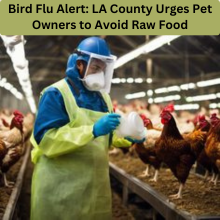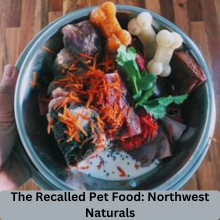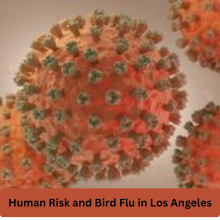
The recent surge in bird flu cases has raised major concerns among Los Angeles County officials, especially when it comes to the safety of pets. With multiple cases of H5N1, a strain of bird flu, being detected in both animals and humans, health experts are urging pet owners to be extra cautious about feeding their pets raw food, especially after an Oregon cat tragically died from consuming tainted raw cat food. This warning came in light of the discovery of bird flu virus particles in certain pet food products.
Understanding Bird Flu (H5N1)
Bird flu, also known as avian influenza, is a highly contagious virus that primarily affects birds. However, in rare cases, it can spread to mammals, including humans. The most concerning strain in recent years has been H5N1, which has caused global outbreaks, particularly in poultry. Infected birds often carry the virus without showing symptoms, which can lead to widespread transmission.
In humans, bird flu can cause severe illness, leading to respiratory distress, fever, and other symptoms, and can occasionally be fatal. Though human infections are relatively rare, the virus can pose a serious threat to both people and animals. This is why the detection of H5N1 in raw pet food has made headlines in Los Angeles.
Recent Bird Flu Outbreak in LA County
Los Angeles County has recently been at the epicenter of heightened bird flu concerns, especially after the first human case of bird flu was confirmed in the area. This case involved an adult worker exposed to infected livestock at a worksite. The individual developed mild symptoms but is recovering with antiviral treatment at home.
Officials are closely monitoring the situation, as the virus has also spread among local wildlife and livestock, including poultry. With at least 36 confirmed human cases of bird flu in California, this outbreak has prompted both state and local authorities to take emergency measures.
Health Risks of Raw Pet Food
Feeding pets raw food has become a popular trend among pet owners, especially those looking to provide their animals with a more natural diet. However, raw meat, poultry, and dairy products carry inherent risks. These foods can contain harmful bacteria, viruses, and parasites that could potentially make both pets and humans sick. Bird flu is one of these risks, as it can be present in poultry and other raw animal products.
Health experts warn against feeding raw pet food, particularly those containing poultry or turkey, as these are the primary carriers of H5N1 bird flu. Consumption of these products could lead to serious health issues for pets, including death, as seen in the Oregon case.
The Recalled Pet Food: Northwest Naturals
One of the major developments in this ongoing situation is the recall of a specific brand of raw pet food. Northwest Naturals Brand 2lb Feline Turkey Recipe Raw & Frozen Pet Food was found to be contaminated with bird flu virus particles. This product, which was sold in California and can be purchased online, has now been linked to a tragic case in Oregon where a house cat died after consuming the recalled food.
The affected product was sold in 2-pound plastic bags with the “best if used by” dates of 05/21/26 B10 and 06/23/2026 B1. Pet owners who have purchased this product are advised to dispose of it immediately.
The Oregon Case: A Cat Dies from Bird Flu
In Oregon, a house cat was found to have died from complications linked to H5N1 after consuming the recalled raw food. This case highlights the potential dangers of feeding raw pet food, especially when it is contaminated with harmful pathogens. The virus likely transferred from the contaminated turkey-based product to the cat, leading to a fatal infection.
This tragedy serves as a stark reminder of the risks posed by feeding pets raw food, particularly during a time when bird flu is circulating in both wildlife and livestock.
Symptoms of Bird Flu in Pets
Pet owners should be aware of the signs and symptoms of bird flu in animals. In cats, common symptoms include:
- Listlessness
- Loss of appetite
- Fever
- Severe depression
- Difficulty breathing
- Neurological issues
- Respiratory problems
If any of these symptoms are observed, it’s essential to contact a veterinarian immediately. Early detection and treatment can make a significant difference in the outcome for infected pets.
Also read: ShopRite’s Big Moves in 2025: New Stores Coming to Jersey Shore
How Bird Flu Spreads Among Animals
Bird flu spreads through direct contact with infected animals or their bodily fluids. Wild birds are often the primary source of the virus, and they can transmit it to domestic poultry, livestock, and even pets. Pets that roam outside may be exposed to infected birds or other wildlife, increasing their risk of infection.
Pet owners should ensure their pets stay indoors, especially if they live in areas where bird flu is prevalent.
Human Risk and Bird Flu in Los Angeles
Although bird flu infections in humans are rare, people who work with livestock or poultry are at a higher risk of exposure. The recent case in LA County, where a worker contracted the virus after exposure to infected animals, highlights this risk. Health officials emphasize the importance of taking precautions to avoid direct contact with sick or dead animals and practicing good hygiene.
While the overall risk of bird flu to the general public remains low, health experts recommend flu vaccines as a preventive measure for both humans and animals.
Government Response and Emergency Measures
In response to the growing concern, California Governor Gavin Newsom declared a state of emergency in December 2024 due to the bird flu outbreak. The declaration is aimed at ensuring the state has the necessary resources to manage the situation and respond quickly to any new cases.
LA County health officials are closely monitoring the spread of the virus and advising residents to take steps to protect both their pets and themselves.
Recommendations for Pet Owners
Pet owners are strongly urged to avoid feeding raw pet food products, especially those containing poultry or turkey. Instead, they should opt for cooked food options that are safer for pets. It is also crucial to:
- Keep pets indoors
- Avoid handling sick or dead wildlife
- Practice good hygiene when feeding and caring for pets
These measures can significantly reduce the risk of bird flu transmission and keep both pets and humans safe.
What Pet Owners Can Do to Protect Their Cats and Dogs
To protect pets from bird flu, pet owners should take proactive measures. These include keeping pets indoors to limit exposure to infected wildlife, maintaining clean living spaces, and regularly monitoring pets for any signs of illness. In case of symptoms, it is vital to seek veterinary help promptly.
Importance of Monitoring Pet Health
Regular health checks and immediate action at the first signs of illness can prevent the spread of bird flu among pets. Owners should be vigilant and observe their pets closely for any changes in behavior or health.
The Importance of Vaccination for Humans
Although there is no specific vaccine for bird flu in pets, humans can take preventive measures by getting the seasonal flu vaccine. This can help reduce the risk of contracting both seasonal and bird flu infections at the same time, which can be dangerous.
Also read: SpaceX’s Bandwagon-2 Launch: A Game-Changer for Space
Conclusion
The bird flu outbreak in Los Angeles County serves as a reminder of the importance of protecting both pets and humans from potential health threats. By avoiding raw food for pets, taking necessary precautions, and staying informed about the latest developments, pet owners can reduce the risk of infection. Keeping pets indoors, practicing good hygiene, and monitoring their health are essential steps in safeguarding them from this potentially deadly virus.
FAQs
What should I do if my pet shows signs of bird flu?
If your pet shows symptoms such as fever, loss of appetite, or difficulty breathing, contact your veterinarian immediately for advice and possible testing.
Is it safe to feed my pet cooked food instead of raw food?
Yes, cooked food is a safer option for pets as it eliminates the risks associated with pathogens like bird flu.
Can bird flu affect dogs as well as cats?
While cats are more commonly affected, dogs can also contract the virus. However, the risk is lower for dogs.
How can I prevent bird flu from spreading in my home?
To prevent the spread of bird flu, keep your pets indoors, avoid contact with wildlife, and practice proper hygiene when handling pets and pet food.
What is the treatment for bird flu in pets?
There is no specific antiviral treatment for bird flu in pets, but supportive care and early intervention by a veterinarian can help manage symptoms.

